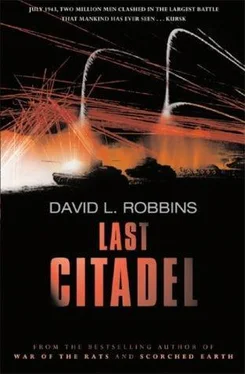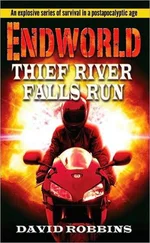‘Before we do anything else,’ he said aloud, ‘you need your name.’
Dimitri walked to another tank crew and from them got a brush and a canister of white paint. Walking back he read the titles given to others of the newly minted T-34s: Motherland; Our Nation’s Defense; Stalin The Father . The commissars loved it when you dubbed your tank something like that. Dimitri would not sloganeer for the Communists. He was the driver. This tank was his to name. He returned to his clearing and climbed aboard. In minutes, on the port side of the turret, he scrawled in large letters the name of his previous two tanks, General Platov , the great Cossack warrior from the bloody war with Napoleon.
‘Now, General ,’ he said in a soothing tone, ‘let’s see what you’ve got.’
From his other two T-34s and over a year of fighting, Dimitri had assembled a box of tools he kept strapped to the hulls. With every tank he abandoned, the box was the last thing he scrabbled for before running for cover. He opened it now and took out a wrench. At the rear of the tank, he unfastened the hatch. The first thing in the compartment was the transmission. The makers of the T-34 were clever fellows. They knew the transmission in their tank was garbage, so they put it right where you could get to it easily, chuck a bad one away and shove in another. This location in the back had one drawback for the driver: it made the tank’s gears tough to shift because of the long drive train running through the floor. Dimitri and the other Russian tank drivers learned to keep a hammer under their seats for the more stubborn moments of the T-34’s transmission.
The next item in the rear compartment was the twelve-cylinder engine. It, too, was easy to dispose of and replace. And spare parts were plentiful during action, a sad and smoking, sometimes burning, vista, but convenient for a buzzard mechanic like Dimitri. He had to hand this to Stalin: While the Germans littered the land with several makes of tank – and from the rumors were about to add two more, larger models – Stalin announced he would shoot any factory manager producing anything but his T-34. A thousand T-34s were pumped out every month in the Urals, to replace the thousand left charred on the steppe or snow or rubbled city streets. Stalin was also pursuing a new, heavier tank design, the KV-1, but these had not yet made any impression in battle, and as far as Dimitri knew there were none in the Kursk salient. The main battle tank for the Red Army remained the T-34, whether it was a good machine or not. This was the Russian way to fight a war, with numbers, massed waves of men and materiel. Lenin himself said it: Quantity is its own quality. The immediate problem facing the Russians was not with the amount of tanks available; every week there grew fewer and fewer trained men left to fight in them.
Dimitri dug his head into the engine compartment, looking over the heart of his new tank. And it was a good heart. The T-34’s motor made it the fastest tank on the field, always, with a top speed of thirty miles per hour. The engine was diesel, efficient, giving a range of up to 260 miles. And unlike the Germans’ gasoline-powered Mark III and IV tanks, the motor also lacked the troubling tendency to blow up in combat.
Dimitri poked around awhile with his wrenches, checking bolts and hose couplings, filters and fittings. He talked to the machine, gentling it, getting it accustomed to its new name, General , and the feel of his hands on its secrets. The designers had three elements to balance when devising this tank: speed, protection, and power. Too much armor slows down speed, too much speed sacrifices the weight needed to carry a big gun and ammo. The T-34 was as good a compromise as any Dimitri had seen on the battlefields. And even when these tanks were knocked out by the hundreds, more kept coming. The Russian way.
Satisfied, he pushed himself out of the engine compartment. He bolted the rear panel tight and laid his tools in the metal case above the fender.
‘Another General Platov .’ Dimitri did not turn to the voice. Instead, he finished his chore. ‘Maybe this time the good General will have better luck. How many lives does a Cossack have, Private?’
Dimitri crouched to wipe his grimy hands on the grass. ‘As many as he needs.’
Valentin stayed quiet for uncomfortable seconds. Then Valentin said, ‘It’s a bad thing when a son has to slap his father.’
Dimitri kept his eyes away from Valentin. The time mounted between them like something coming out of the ground. Valentin lifted himself onto the tank and into the commander’s hatch. The T-34’s large hatch cover hinged toward the front, forcing the commander to stand behind it. It was done this way to protect the commander during combat from ahead, but in the end it was simply cumbersome, difficult to see around, and the cause of many bloody noses during sudden stops. But Valentin looked good in the commander’s spot, peering down at Dimitri kneeling in the grass. He had a Cossack nose, sharp and long like a sword, a square jaw, and the blue eyes of the Azov sky, the ancient canopy for the Kuban and Don horsemen. Dimitri had passed to his son his own wiry build and black hair. But the boy did not always keep his head up, and Dimitri lamented that he had given Valentin a Cossack’s body but not his soul.
Dimitri rose and stepped back from the General , to let the boy have it to himself for a while, for it was new to him, too. Valentin’s head disappeared into the tank, the hatch banged shut above him. In seconds the tank came alive. The periscope in the commander’s hatch began to rotate. Then Valentin worked the manual crank to elevate the main gun. The long barrel lifted to its full height, thirty degrees, then drooped to its lowest elevation, minus three degrees. The turret’s low profile made it a hard target, but the closeness of the gun mantlet to the chassis made it impossible to depress the main gun far. This restricted the gunner’s ability to fire at close targets, or to level the barrel when the tank sat behind a protective berm with the hull tilted up. So many compromises, Dimitri thought. So much left undone in the making of a tank, a son.
Dimitri watched the tank, silent and motionless now, wrapped around his boy. Together he and Valya had fought and killed, escaped and spit smoke and blood. Dimitri did not know how many German tanks they’d faced in the war, hundreds certainly. He had no count of how many they’d beaten. Enough to still be standing here, whatever the number. Valentin in combat was an excellent gunner, his marksmanship with the 76 mm main gun was as good as any tanker. But as a commander, when the bold time came, that moment in every battle when you face life or death and leave it to God to decide, the boy could hesitate. He waited for instructions, held in check by the Communists, who fight sometimes as if they’re afraid to go in alone, so instead they die in ten thousands. These times Dimitri took over, he turned the tank toward God and the Germans and told the boys over the intercom to keep shooting. The others in their crews, the ones dead now, believed he was insane. He wasn’t, ever. He was a Cossack.
The commander’s hatch lifted with a creak. I’ll need to grease that, thought Dimitri. I’ll need to groom the whole damn thing, and then some German will shoot it out from under me again. Valentin hoisted himself out of the hatch, dropping gracefully to the ground.
‘Good,’ he said.
‘I think so,’ Dimitri agreed.
Valentin stuck his tongue inside his lip. He looked at his boots. ‘I’m sorry I’m such a disappointment to you.’
Dimitri glared at the top of his son’s head, longing to yank Valya’s eyes up from the earth.
Читать дальше












